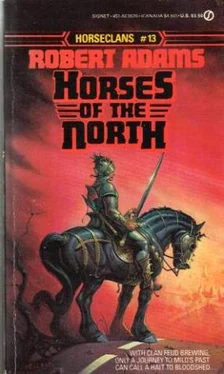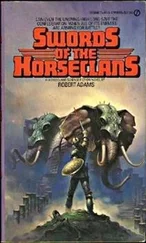However, the only two deaths sustained by the foragers were from causes other than plague. The first to die was a sixteen-year-old boy who forced open a sliding door on the fifteenth floor of a hotel and was found after some searching by the rest of the party dead at the bottom of an elevator shaft; he had not, obviously, known what an elevator was. The other unfortunate was a man, one of Krueger’s farmers and of enough age to have conceivably known better, who had disregarded Milo’s injunction to leave alone the cases of aged, decomposing dynamite they had found in a shed. He had been vaporized, along with the shed, in the resultant explosion.
With the explosives that had been stored properly and were still in safe, reliable, usable condition, Milo, Krueger and certain of the older men experienced with dynamite or TNT had chosen spots carefully and then had blown down sizable chunks of rock to completely block stretches of both Route 80 and Route 50, the two routes the former slaves recalled as having been used by biker gangs. They might not be stopped, but they certainly would be considerably slowed down, the two leaders figured, which would, they hoped, give the former farmerfolk more of what was becoming a rare and precious commodity—time.
It had become clear that were they to forsake the trucks entirely, they were going to need more horses or mules, so Milo had gathered his group of horse-hunters and ridden out in search of feral herds. Luck had ridden with them. They had found a smallish herd on the second day, and a week’s hard, dangerous work had netted them a herd of some two dozen captive equines, including six that showed the conformation and size of heavy draft-horse breeding.
When they had brought back their catch and turned the beasts over to the breaker-trainers, they had rested for a day, then ridden back out, this time to the southeast. They were gone for two weeks and returned—dog dirty, hungry, thirsty and exhausted—without a single horse … but with five towering, long-legged dromedaries. They had found the outré animals wandering about an arid area and managed to trap them in a small, convenient box canyon. After a few of the men had been bitten by the savage beasts, there was a strong sentiment to kill one for meat and turn the others free to live or die on their own, but Milo had insisted that they be roped and led back to the farming areas, stressing his experiences in certain parts of Africa, where such as these had often demonstrated the ability to draw or bear stupendous loads on little food and less water.
Paul Krueger had not been too certain of the wisdom of trying to use the camels, remarking, “There’s never been a really tame one, you know—not even those born in captivity are ever safe to be around all the time. And we don’t have any harness that we can easily adapt to them or time left to make separate sets, even if we had the hands and the material left to make them.”
Milo shrugged. “Well, why not try them as pack animals, Paul? We can always turn them loose or slaughter them for food if they don’t work out for us. As I recall, the Sudanese could pack loads of a quarter of a ton on each camel, and in our present straits, five animals that can, between them, carry a ton and a quarter aren’t to be sneezed at or lightly dismissed.”
“Who’s going to drive the vicious fuckers?” Krueger had then demanded. “Not me! I’ve got a care to keep my hide in one piece.”
“No need to drive them.” Milo shook his head. “Just hitch their headstalls to the tails of as many carts.”
Krueger grudgingly consented to the inclusion of the camels and was later to thank Providence that he had so done.
Chief Gus Scott brought all of his folk to the lavish feast prepared and proffered by the Horseclansfolk, but he brought them in relays, so that the herds remained guarded and the necessary camp work got done, despite everything, which signs of organizational abilities and natural leadership qualities served to increase Milo’s admiration for the man.
That a few boys and girls of marriageable age of both the Horseclans and the Scott tribe seemed to find the company of one another extremely fascinating pleased Milo no end, for he was become determined that when he and his moved on southwest the Scotts would move with them, winter with them and, he hoped, emerge with the spring thaws as another clan of the Kindred.
Jules LeBonne did come to the feast, but brought with him only his personal bodyguards, perhaps a dozen of them, all as filthy as their chief, all as heavily armed and all almost as arrogant. That LeBonne and all his henchmen were contemptuous of their hosts and of Chief Scottwas obvious from the outset. Only by keeping an exceedingly tight rein on his own people was Milo able to prevent open combat which must surely have resulted in the quick deaths of all thirteen of the French-speaking guests; he was later to regret that he had not countenanced their killing then and there, for it would have saved later death and suffering.
Deliberately waiting until LeBonne and most of his entourage were become impossibly befuddled with alcohol and hemp, Milo broached his proposal to Gus Scott bluntly, saying, “Chief Gus, my folk and I have no axes to grind, no blood to avenge, insofar as concerns those folks in that fort, so I want your leave to ride into their settlement and try to arrange a passage across the ford they command for my clans and herds. Winter could come down on us anytime now, and I don’t want to be caught by it out on these open expanses, or, even worse, in some mountain pass on my way up to the high plains. Am I successful, it just might help you and your aims; do I fail, it certainly won’t hurt you and them and it will mean that I and my clans will then have a reason to join our arms with yours in defeating those people and thus opening the ford for our use. ”
But Gus Scott shook his head. “I like you, Chief Milo, and whatall you a-talking here, it’s pure, quick suicide; them damn bastids, they’ll shoot you offen your hoss five hunnert yards out! You got no way of realizing jest how damn far them bugtits’ guns can shoot—ain’t no living man as does, ’cepting of me and Jules and a few others of our folks as has seen ’em.”
But Milo was adamant, continuing to argue, and, at length, he gained the grudging agreement of Gus Scott. By that time, the nodding Chef Jules would grinningly agree to any questions put to him, not that Milo thought the spaced-out inebriate really understood any of it, but at least the forms had been served after a fashion.
The very next dawning, while most of the camp still slept, Milo gathered the clan chiefs and gave them his instructions, then rode out of camp alone, mounted on a borrowed easily seen white horse. He bore only his saber and his dirk, those plus a headless lance shaft to which he had firmly affixed a yard-square piece of the whitest cloth he had been able to turn up in his camp. He set his horse’s head toward the northwest, toward the certain death that Chief Gus Scott was convinced awaited him.
As he rode through the main gate of the fort, disarmed and under close, heavy guard, Milo’s glances to right and left took in the stripped, rusting shells of the self-propelled guns and other armored vehicles. He mentally noted that as the breeches of the long guns were carefully shrouded and the barrels plugged at the muzzles, they just might still be supplied with shells and capable of being safely fired, which boded exceedingly ill for Scott, LeBonne or any other men who elected to mount a charge in force against the fort.
However, he also noted that of the men manning the wall walks, only a mere handful bore firearms of any sort, most of them being armed with crossbows, recurved bows and polearms. At the corners of the walls and on a wide platform above the gate squatted engines that looked very much to him like pictures he recalled seeing long, long ago of ballistae and catapults. Stacks of short, heavy spears stood by the former and piles of round rocks by the latter.
Читать дальше












